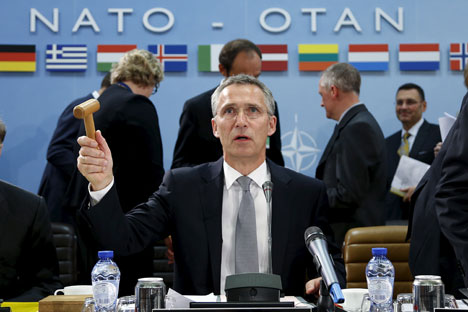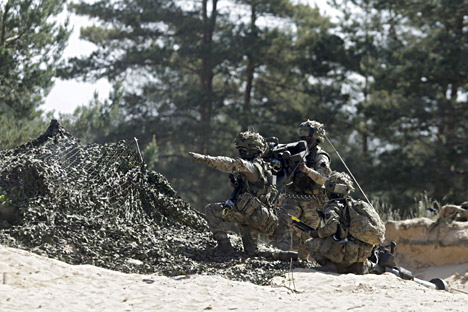Press Digest: Apple in talks with Russian video services over TV platform

What is the future for Apple TV in Russia? Source: Reuters
ReutersApple in negotiations with Russian video services
Apple is in talks with Russian video services, including ivi.ru, Nemo TV, Ayyo, and Megogo, the Kommersant business daily reports, citing a source familiar with the company's plans. The news has also been confirmed by top managers in the internet industry.
"Each company's products will have all possible functions, yet special versions of applications may be released too, offering broader functions," says a source familiar with the negotiations.
A Kommersant source at one of the above video services has confirmed that the company is developing an application for the Apple TV platform.
"It is one of the most promising environments for VoD (Video on Demand) applications, given iOS users’ consumer activity," said the source, adding that the company will be sharing its sales with Apple.
“Everything will be organized as in iTunes Store, i.e. when content is sold via these applications, Apple will receive a commission from each transaction,” Redmadrobot technical director Artur Sakharov explains.
Tvigle founder Yegor Yakovlev, however, believes that Apple TV prospects in Russia are not so certain for a number of reasons, including piracy, the economic crisis and more familiar alternatives, like Smart TV.
Megogo managing director for Russia Viktor Chekanov agrees: “With Apple TV, Apple is entering a highly competitive environment,” he said. Any platform – be it Smart TV or Apple TV – tries to enter the market with top-quality content in the form of applications. They are its driving force, he says, adding that Apple has not contracted Megogo as regards developing applications for the new device.
Apple was unavailable for comment.
Donbass volunteers return home
Last weekend, the newly created Union of Donbass Volunteers held its founding congress. The purpose of the organization is to assist volunteers who fought in the Donbass region of eastern Ukraine to integrate back into peaceful life back in Russia, reports the centrist daily Nezavisimaya Gazeta.
According to official documents, the Union of Donbass Volunteers has been set up “to unite Russian volunteers who had helped to defend the self-proclaimed republics [of Donetsk and Lugansk] against aggression from the Ukrainian armed forces, to arrange for medical treatment of sick and wounded volunteers, assist the families of volunteers who were killed as well as those volunteers who have found themselves in reduced circumstances or unemployed.”
The organization’s documents define volunteers as those “who helped to defend the Donbass against an external aggression.”
In a separate development, the head of the Russian Federal Migration Service (FMS), Konstantin Romodanovsky, announced recently that residents of southeast Ukraine have started going back home. He said that some 1,500 refugees leave Russia every 10 days.
“For me, there is a certain indicator, it is the number of people who cross the border in Rostov Region in both directions. There we record about 1,400-1,500 people leaving Russia for Ukraine. There is a small outflow, but it is no compensation for the mass influx of 8,000 refugees a day that we used to have,” he said.
According to Romodanovsky, the FMS views this outflow as “a positive signal” linked primarily to the fact that the situation in the Donbass is returning to normal.
Russia being dragged into war for water in Central Asia
Control over water resources in Central Asia could result in a full-scale war, warns the news website Gazeta.ru, citing an official statement released by the press service of Islom Karimov, the president of Uzbekistan.
Uzbekistan is categorically opposed to the construction of two cascades of hydroelectric power plants that Russia is planning in neighboring Kyrgyzstan as this may result in a shortage of irrigation water in Uzbekistan.
The region is already chronically short of water. This week, Kyrgyzstan cut water supplies from its Jalal-Abad Region to Uzbekistan’s Namangan Region 20-fold.
Russia and Kyrgyzstan signed an agreement on the construction and operation of the Kambaratinskaya and Verkhne-Narynsky cascades back in 2009, however, the construction was then suspended. The decision to resume the project was taken in 2012.
Tajikistan is also opposed to the project, whereas Kazakhstan has expressed an interest in building hydropower units. The Central Asian republics cannot agree between themselves, while Moscow is not pushing events either.
“The great water truce is a fragile thing. The statements by President Karimov and Turkmen President Gurbanguly Berdimuhamedow made after his visit to [the Uzbek capital] Tashkent are meant more as a publicity stunt. They are aimed to calm down the local population and reassure them that water supplies will not dry up,” said pundit Alexei Mukhin, head of the Political Information Center.
All rights reserved by Rossiyskaya Gazeta.
Subscribe
to our newsletter!
Get the week's best stories straight to your inbox


